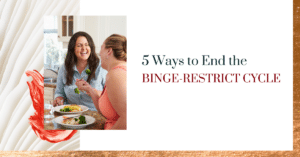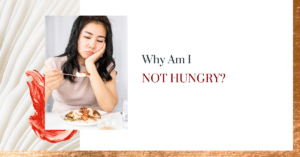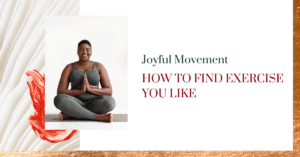Intuitive Eating During the Holidays

Eating during the holidays can be a source of stress, anxiety, and tension for many. Practicing intuitive eating during the holidays can help ease the tension and help you find more peace and joy with food. Here are six tips for intuitive eating during the holiday season, so you feel more relaxed and at peace.

The holidays are coming, which can often bring stressful family interactions, crazy food, diet and weight talk, and fears or anxiety about all the food and alcohol that’s around.
The holiday season used to cause me so much stress and anxiety. With so much delicious food around 24/7 – homemade cookies in the office break room, a bunch of big family dinners, and a different holiday party almost every night – I constantly worried about what and how much I was eating.
Food was more than just food – eating a cookie became: “This is bad for you, you shouldn’t eat it”.
I’d constantly try to compensate for my eating by exercising or restricting the next day. And I’d always have big plans to “start over” on January 1st…which inevitably led to me feeling out of control around food all December long.
What I didn’t realize at the time was that by trying to avoid or “portion control” my holiday foods, all the while thinking I’d just start over next month – this is what was leading me to feel out of control around food. My body sensed that restriction was on the horizon, and every eating occasion became a chance to do “good” or “screw up”.
Because the problem isn’t the holiday food itself. The problem is our attitude about food and eating the rest of the year.
Have you ever tracked your food intake, or counted points, calories, or carbs? Or maybe you try to be “good” with your portion sizes or the foods that you eat or don’t eat? What happens is, when you try so hard to be “good” with your food choices, your body feels restricted and deprived, and it literally thinks you are starving. So it’s no wonder that by the time the holidays roll around, you end up feeling out of control around food and unable to eat without feeling completely over-full and stuffed.
The good news: it IS possible to have a holiday season where:
- You can enjoy all of the food you truly want
- You eat according to how your body feels
- You feel prepared to deal with uncomfortable comments about weight, food, and diets
- You don’t dread getting “back on the wagon” again come January 1st
Here are some of my tips to help you work on and implement intuitive eating during the holiday season – so you don’t feel out of control around food all month long.
1. Do not plan to go on a diet in January.
The mindset of “I’ll just start over on Monday” or “The holidays are a wash, I’ll just go on a diet/cleanse/etc in January” — this is a large part of the reason why you end up feeling out of control throughout the holidays.
Because if that’s in the back of your head – even if it’s more of subconscious thought – your body knows that restriction and deprivation are around the corner. Even though you may technically be surrounded by food, this upcoming restriction triggers a mental deprivation and your body reacts like it’s in starvation mode. This then influences how you behave around food.
Relying on a diet come January – either consciously or subconsciously – is why you end up feeling like you can’t pass up the buffet or the appetizers at that holiday party. Why you can’t pass by those cookies at work without grabbing a few. And why you end up feeling stuffed and out of control all month long.
Read more about why diets don’t work and start to shift your mindset around this idea of dieting.
2. Give Yourself Permission To Eat
Avoiding your favorite holiday foods causes cravings to increase, not decrease, which is always going to be a set up to feel out of control around these foods. Remember that no single meal or snack (or drink or dessert) will make you “unhealthy”.
Sticking to the foods that we deem “healthy,” instead of giving ourselves permission to eat what we enjoy and eat to satisfaction, will leave a lot to be desired. Try to notice what you consider “unhealthy” and why, and try removing that filter from your food decisions. Instead think about “what sounds good to me right now?”
There’s room for all the foods. When you eat, do so mindfully and with intention – allow yourself to experience the food wholly and completely (remember: with no judgment!).
This is hard, and you’re not going to perfect it overnight. It isn’t a holiday-only rule – this unconditional permission to eat all the foods should be practiced on a daily basis until you break the cycle of deprivation/guilt-ridden overeating. If you’re looking for more support, check out my 5 Step Guide to Getting Started with Intuitive Eating, Unapologetically.
3. Tune Into Your Body Cues
Holidays can be stressful, with a lot going on. This can make it tougher to be aware of our body cues. Try to bring some extra awareness to your interoceptive cues – that is, your feelings of hunger, of fullness, of satisfaction, and overall how your body is feeling.
Before eating, take a few minutes to assess your hunger level – how hungry do you feel? What are you in the mood for? What sounds good? Give yourself permission (as in #2 tip above) to eat whatever it is that sounds good, and pay attention to how your body feels as you’re eating it.
Check-in with your body partway through the meal and then again at the end:
- How does your body feel? What do you notice?
- How does that food taste?
- You may consider trying the hunger-fullness scale
A note on hunger-fullness cues: while tuning into your body cues is important, you want to watch out that you don’t turn this into the “hunger-fullness diet”. It’s normal to eat past the point of fullness during the holidays or to try a special cookie or dessert even if you aren’t hungry. This is ok! But it’s also ok to turn down food and say “no thanks” if you really don’t feel like eating it.
As Evelyn Tribole talks about in her Holiday Bill of Rights, you don’t have to overeat in order to please family members and you also don’t need to give a reason for why you’re saying no. Listen to your body and trust yourself. Plus, you can always take a plate of leftovers home for later.
4. Eat Consistent Meals and Snacks
Oftentimes people try to ‘save up’ for the big holiday meal. In reality, this usually backfires: by the time you allow yourself to eat, your body is so over-hungry and feeling deprived, which makes it really hard to enjoy the food or to stop when you feel comfortably full. Skipping meals can lead to low blood sugar, increased cravings, and increased binging.
Instead of saving up, continue to eat consistent meals throughout the day. Pay attention to your hunger cues, and work to honor each and every instance of hunger that occurs throughout the day.
This goes for non-holiday meal days too. If you aren’t consistently eating when you feel hunger, then your body starts to lose trust in you feeding it – which means, when you do start to eat, you may find it harder to stop eating when you’re full. Your body isn’t sure when you’ll eat next, so it can push you to eat more and ‘save up’.
Eating consistent meals with plenty of variety and excitement will help satisfy your hunger and keep you from feeling deprived.
5. Watch Out For The “Last Supper Mentality”
The last supper mentality is the idea that if you’ve eaten a “bad” food or had a “bad” day, then the day is shot and you might as well just keep ignoring your body cues – because you’ll start over tomorrow. This is common throughout the year, but tends to happen even more often during the holidays.
Similar to vowing now to go on a diet come January (see tip #1), work on ridding yourself of the all or nothing thinking that causes you to label certain meals or foods as “good” and others as “bad”. This means that no matter what or how much you eat, you can tune back into your body for the next meal.
6. Set Boundaries
Being around friends and family during the holiday may mean opening yourself up to food, diet and weight or body talk. Figuring out how to deal with comments – whether directed towards what you’re eating, pushing food at you, or just general weight/diet talk – can help you get through the day without as much anxiety or stress. By setting boundaries with friends and loved ones at the beginning of the holiday season, you may find you will enjoy the holidays more.
I know it can be uncomfortable to voice disagreement with someone, but remember that it doesn’t have to be a whole big thing. You can simply change the subject to something more pleasant, in a friendly way—like “I think you’re beautiful exactly as you are, and there’s so much else I want to catch up on. Tell me about [XYZ pleasant topic that you know they’ll want to discuss].”
Or if you’re up for something a little more direct and self-revealing (and you feel safe with the person in question), you can say “I actually have a hard time hearing about people’s diets / nutrition programs / wellness protocols, because those things have really messed up my own relationship with food, and I’m trying to heal.”
You can also simply excuse yourself from the conversation and go into another room to breathe, vent to a friend over text, or listen to a few minutes of a podcast. Take a break if you find yourself getting overwhelmed with family socializing, all the food sitting around, your aunt talking about how she shouldn’t eat another piece of pie…whatever it is…know that you can step away from the situation for a pause at any time.
Some ideas:
- Take a bathroom break and remind yourself of your values or a positive mantra
- Step outside and get some fresh air
- Leave the conversation entirely and go hang out with a “safe” person
- Take a break and listen to a supportive podcast episode
Remember, you have the right to have boundaries and to protect yourself. For more ideas for dealing with diet talk, check out this blog post.
Looking for more support?
We work with clients virtually throughout the US, helping people who are tired of dieting change their relationship with food and their bodies. Learn more about our intuitive eating coaching programs to see how you can find balance and develop long-term lifestyle habits, no guilt or obsession required.
You can also check out my Unapologetic Eating 101 Course, an online, self-paced program to liberate yourself from dieting and make peace with food and your body.
Author Bio
This article was written and reviewed by Alissa Rumsey, MS, RD, CSCS, a registered dietitian and Certified Intuitive Eating Counselor. She specializes in weight-inclusive care, intuitive eating, body image healing, mindfulness, self-compassion, and healing from chronic dieting, disordered eating, and eating disorders. Alissa holds a Bachelor’s Degree in Nutrition and Exercise Science, and a Master’s Degree in Health Communications, and is also an NSCA Certified Strength and Conditioning Specialist.
2 Comments
Leave a Comment
share the love

about
Alissa Rumsey, RD.
Alissa Rumsey, MS, RD, CDN, CSCS (pronouns she/her/hers) is a registered
dietitian, nutrition therapist, certified intuitive eating counselor, and the author of
Unapologetic Eating: Make Peace With Food and Transform Your Life. Alissa is
passionate about helping people reclaim the space to eat and live,
unapologetically.

A twice-a-month round-up of inspirational stories, lessons, practical tips and encouragement for living your most authentic, unapologetic life.
The Unapologetic Life
RECENT POSTS

The Unapologetic Life
A twice-a-month round-up of inspirational stories, lessons, practical tips and encouragement for living your most authentic, unapologetic life.











This really seems logical.
Thanks Trish, I hope you have a wonderful holiday season 🙂